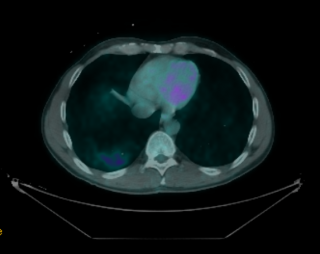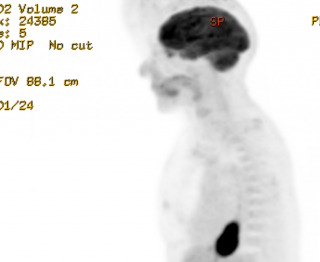Here at the Institute of Nuclear Medicine, we are undertaking research projects about a range of cancers, most of our research regards angiogenesis in cancer tumours.
In the UK a patient is informed of their cancer diagnosis every two minutes. Nationally there has been a twofold increase in patients surviving cancer within the last 40 years. However, a broad variation in survival rates still occurs within different tumour types [1].
Angiogenesis plays an important role in cell proliferation and is the study of how new blood vessels form to supply cells with the nutrients and oxygen they require to survive. Cancer cells grow rapidly and require increased vasculature to support their incessant cell division. They are able to secrete endogenous chemical signals to stimulate the growth of new blood vessels [2].
The inner lining of any blood vessel is composed of a thin layer of simple or squamous cells called endothelial cells. On their cell membranes they have binding receptors to which a broad range of identified proteins can attach. These proteins can be categorised into either angiogenic ‘activators’ (promotes growth) or angiogenic ‘inhibitors’ (interferes with growth). The formation of new blood vessels (neoangiogenesis) for cancer cells is dependent upon the balanced interaction of activators and inhibitors. Examples of angiogenic activators include the family of Vascular Endothelial Growth Factors (VEGF), basic Fibroblast Growth Factor (bFGF), Interleukin 8 and Transforming Growth factor (TGF). VEGF now plays an important role and is considered a very powerful angiogenic activator in both cancerous and normal tissue [3].
Pathological staining of post-surgical tumour specimens can identify a range of angiogenic activators and inhibitors. The in vivo measurements of tumour vasculature from imaging perfusion techniques along with functional information yielded from a range of PET tracers are being studied to investigate angiogenesis for a range of tumour types. In vivo tumour characterisation that underpins precision medicine in cancer is a major drive in oncology today.
- Lung Cancer Research

Lung Cancer Research
Angiogenesis in lung tumours project. This project uses a range of PET tracers to visualise lung tumours in patients in non-small cell lung cancer. We have also investigated the use of PET/MRI and CT perfusion scanning.- Oesophageal Cancer Research
Oesophageal Cancer Research
Angiogenesis in upper GI tumours project. This project uses FDG PET/MRI and PET/CT to visualise lung tumours in patients with a range of upper GI cancers. We have also investigated the use CT perfusion scanning.
Content by Dr Christine Tang- Breast Cancer Research
Content by Dr Stefan Voo
Breast Cancer Research
- Prostate Cancer Research
Content by Dr Asim Afaq
Prostate Cancer Research
References:
1. Cancer statistics for the UK. Cancer Research UK.
https://www.cancerresearchuk.org/health-professional/cancer-statistics-for-the-uk
2. Angiogenesis Inhibitors. National Cancer Institute (2018)
https://www.cancer.gov/about-cancer/treatment/types/immunotherapy/angiogenesis-inhibitors-fact-sheet
3. Angiogenesis on Cancer. Vascular Health and Risk Management (2006). Vol 2 Issue 3 pp 213 -219, Nishida N; Yano H; Nishida T; Kamura T; Kojiro M.
Content by Darren Walls
 Close
Close


